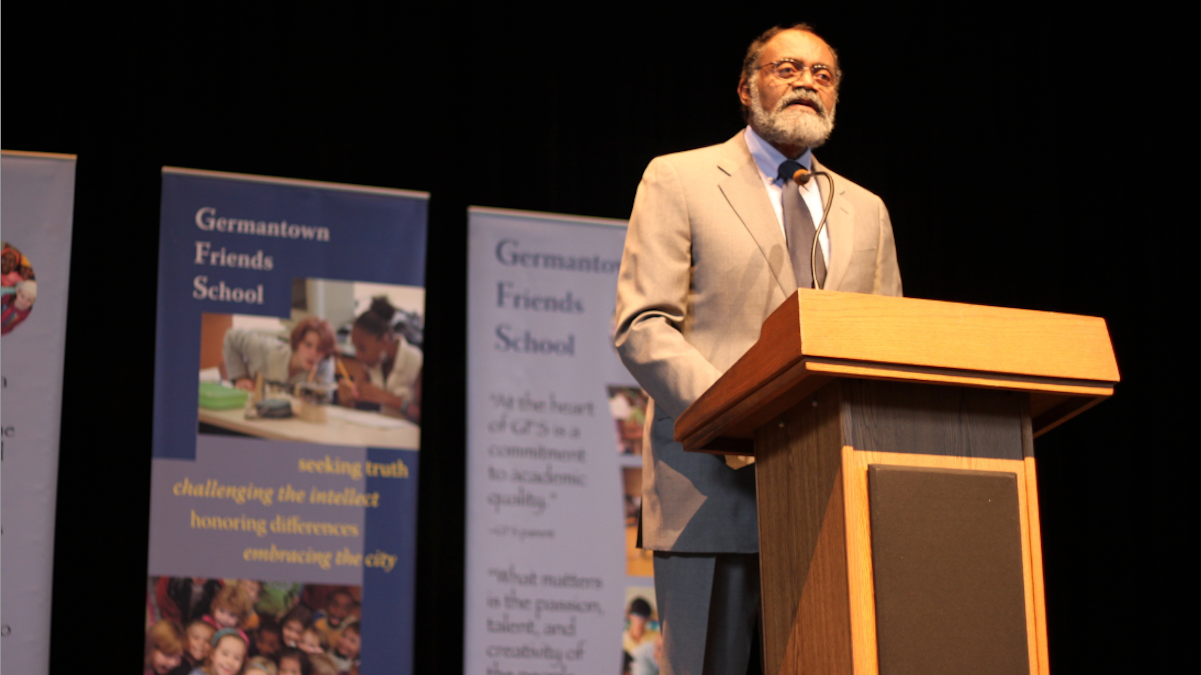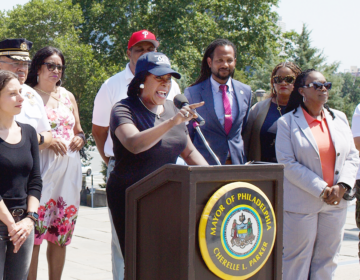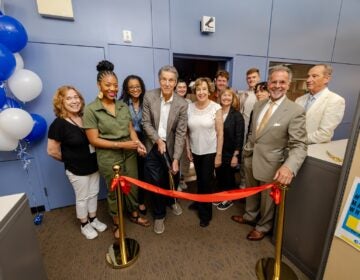Federal judge emphasizes empathy from the bench and beyond at annual GFS lecture

At Wednesday's Tate Lecture for Public Service, federal Judge Theodore McKee spoke about having respect for others. (Matthew Grady/for NewsWorks)
Acknowledging another notable Northwest Philadelphia resident, federal Judge Theodore McKee bought the Germantown Friends School audience’s attention to his wristwatch.
To underscore his speech’s theme of respect for others on Wednesday, McKee referenced how the late U.S. Sen. Arlen Specter would remove his watch before addressing a group of people, demonstrating that he was aware of the time and would not waste theirs.
While the timepiece remained on McKee’s wrist, the point was made.
“By being respectful of people,” he said, “the way you conduct yourself can have an amazing impact on how other people regard themselves.”
Judicial GFS ties
On Wednesday morning, GFS students, staff and alumni gathered for the Tate Lecture for Public Service, an annual event held in recognition of the life and work of Mercer Tate, GFS Class of 1948.
McKee is chief judge of the United States Court of Appeals for the Third Circuit, nominated in 1994 by President Bill Clinton. His daughters, Emilia and Marisol, graduated GFS in 2006 and 2008 respectively.
Coincidentally, the seat was vacated by Judge A. Leon Higginbotham, Jr., a parent of GFS alumni. In 2010, McKee was elevated to the post of Chief Judge, succeeding Judge Anthony Scirica, also a parent of GFS alumni.
Prior to his appointment, McKee served as Assistant U.S. Attorney for the Eastern District of Pennsylvania, a Deputy City Solicitor, and served as a judge of the Court of Common Pleas for more than 11 years.
“He is a true steward of our community,” said GFS Head of School Dana Okeson Weeks.
McKee’s speech
To emphasize the importance of respect and dignity for one’s fellow man, McKee recalled his time spent on the Court of Common Pleas where, for three years, he presided over homicide trials.
In that capacity, he heard numerous waiver trials, where the defendant gives up the right to a jury trial and a judge determines the merits of the case in their place.
McKee recalled a case in which he convicted a defendant of second-degree murder, which, in Pennsylvania, carries a mandatory life sentence.
While giving the defendant a choice between immediate or delayed sentencing, the convicted man opted to invoke his right to speak to the judge directly before the sentence was imposed.
McKee reminded the man that he would likely die in prison given that a pardon was improbable and there was no opportunity for parole.
The man responded, “I just wanted to thank you.”
Pausing for a second, McKee was surprised.
“I’m not sure I get you,” he replied.
Reminding the man of the implications of the sentence, McKee asked, “Why are you thanking me?”
“Judge, since I’ve been coming into this courtroom for this trial, from the day I came in here, you treated me with respect,” he recalled. “It’s really the first time in my life anyone has treated me with respect, and I just wanted to thank you for that.”
The sentiment hit McKee like a brick.
“I almost got teared up,” he confessed. “I said to him, ‘It’s a hell of a thing that you have to murder somebody to be treated with respect.'”
“I’ve been telling myself that since I came into this courtroom,” replied the defendant, before being led away in handcuffs. “Had I been in a situation where someone treated me respectfully, as a man, I might not have been here now.”
McKee said the exchange left a lasting impression.
“I never forgot that,” said McKee, “because it brought home to me that no matter how insignificant you thought your interaction is with someone, you can make a difference in that person’s life.”
The backstory
Tate, for whom the annual series is named, was a prominent public servant.
His career included being Democratic leader in the ninth ward, Fellowship Commission president, United Neighborhood Centers of America president and a delegate to the Pennsylvania Constitutional Convention, where he helped rewrite the state constitution, according to GFS literature.
WHYY is your source for fact-based, in-depth journalism and information. As a nonprofit organization, we rely on financial support from readers like you. Please give today.




